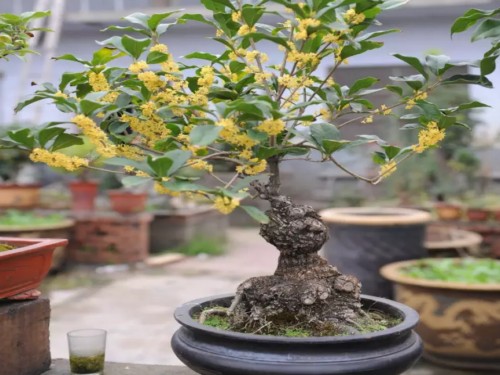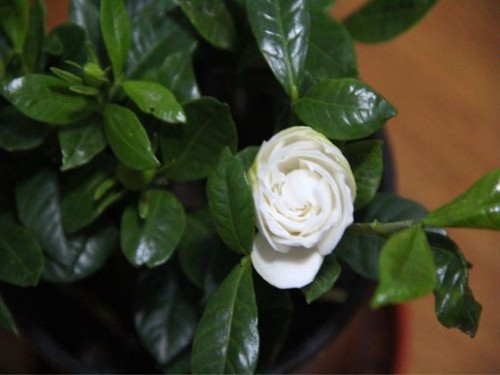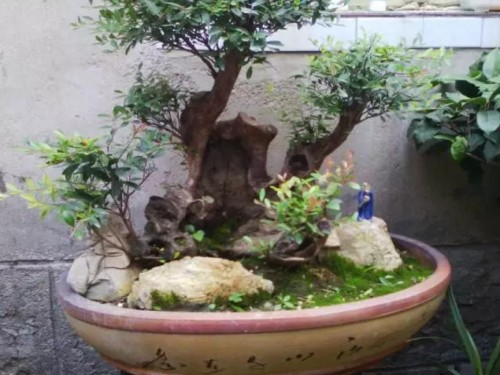What if potted sweet-scented osmanthus trees don't blossom?
A gust of wind blowing, countless osmanthus like a golden butterfly, quietly falling at my feet. I picked one up and looked at it carefully. What small flowers! Rice size petals and small stamens constitute a small and exquisite osmanthus. Usually a dozen flowers clustered together, forming a small flower ball, densely packed, a cluster linked to a cluster. At first glance, it looks like a small yellow hydrangea. Osmanthus tree leaves pointed at both ends, green, like angels have been guarding the osmanthus, osmanthus in its shelter enjoy blooming!
From a distance, I could smell the aroma. This reminds me of a poet who once wrote such a poem: "laurel fall in the moon, Tianxiang cloud floating outside." No wonder it also has a nickname---10 Li Xiang. I took a deep breath and felt refreshed and relaxed.
Osmanthus fragrans is one of the top ten traditional flowers in China, and it is also a good material for making bonsai. However, many osmanthus bonsai planted for many years do not bloom or blossom very little.

Reasons why potted osmanthus flowers are not easy to bloom:
Osmanthus has a long life span, so the flowering time is also late. Seedlings propagated by sowing take about 10 years to flower. Grafted laurel, four seasons laurel, can bloom in the same year; and grafted laurel, silver laurel, etc., to the next year only 20% flowering; ramets or layering propagation seedlings, most can bloom in the next year; cutting seedlings generally need 4 years to bloom. Therefore, flowers cannot bloom until they bloom. If it has reached the flowering age and does not bloom, it is improper maintenance, for the following reasons:
1. Osmanthus flowers love the sun and are flowers and trees with long sunshine. Once the balcony is too shaded and the daily light is less than 10 hours, the branches and leaves will not grow luxuriantly, and of course they will not bloom.
2. Improper fertilization. If nitrogen fertilizer is applied for a long time, it will make the branches and leaves grow excessively and affect flowering.
3, too much watering or even rainy days in the basin water, are easy to rot roots, leaves, affecting flowering.
4. Potted osmanthus flowers, due to long-term non-replacement of pots, lead to full roots in the pots, root extension does not open, conduction ability is weakened, insufficient nutrients are obtained, resulting in normal flowering in flowering period.
5, potted osmanthus flower in winter early winter, such as room temperature is high, above 10℃, osmanthus flower can not get the physiological requirements of low temperature dormancy, will affect the flowering of the next year.
6, osmanthus is not resistant to smoke, such as ambient air pollution, poor growth, leaves become smaller and easy to fall off, it is difficult to bloom. Leaf washing and foliar topdressing can be carried out once every half month, so that the dust on the leaves can be washed away, and the fertilizer solution can be absorbed through the leaves to make the plants grow strong and enhance the ability to resist pollution.
7. Osmanthus fragrans is not easy to flower in potted plants in northern China because Osmanthus fragrans needs to have a low temperature hibernation stage for flower bud differentiation in winter. In winter, there are heating equipment indoors in northern areas, which makes osmanthus flowers not go through dormancy stage. Therefore, in the northern region, osmanthus should pay attention to providing a cold and dry environment in winter, and it is best to put it in a place with an average temperature of 3~5℃.
According to osmanthus flower habits, combined with years of practice, potted osmanthus flower bonsai will not bloom or flowering less common countermeasures are as follows.
1. Breeding improved varieties:
When cultivating Osmanthus fragrans potted landscape, select Osmanthus fragrans excellent varieties with strong adaptability, disease and insect resistance, easy flowering, colorful flowers, dense internodes and small leaves, and the cultivated Osmanthus fragrans potted landscape is easy to bloom, has more flowers and is rich in color and fragrance.
2, placed properly:
Potted osmanthus flowers need to be placed in a place with sufficient light. It must be ensured that there should be more than 10 hours of sunshine every day to meet the sunshine needs, effectively accumulate nutrients, and flower buds bloom normally; at the same time, osmanthus flowers should be kept clean and ventilated well.
3. Rational fertilization:
Osmanthus potted landscape fertilization should be divided into 3 steps: first, before germination in early spring, apply nitrogen, phosphorus and potassium fertilizer every half month, and apply phosphorus and potassium fertilizer 3 to 4 times from May to August. Don't apply too much nitrogen fertilizer to prevent excessive growth of branches and leaves and few or no flowers. According to the characteristics of osmanthus bonsai like fertilizer, do not apply thick fertilizer, do thin fertilizer frequently.
4. Reasonable watering:
According to the size and growth characteristics of osmanthus bonsai, combined with season, weather, pot texture, size, how much pot soil, reasonable watering. Spring, autumn, winter three seasons should make osmanthus bonsai to maintain 30% water content, hot summer, 60% water content is appropriate, do not dry and too wet, do not dry irrigation, irrigation is poured through.
5, early spring out of the room, pruning before germination:
Cut off sick weak branches and over-dense branches. After germination, according to the number of buds, according to the principle of "except dense and sparse, except internal, except weak and strong, except straight and flat", appropriate bud thinning can be carried out to improve illumination, enhance ventilation and light transmission, and promote growth and flower bud differentiation.
When the osmanthus branches grow to about 10 cm and stop growing, they cannot be shaped and pruned for other reasons (May to August) before flowering to prevent cutting off the flowering branches. Osmanthus fragrans potted plants can not be pruned too much, nor can they lack pruning for a long time, and only through reasonable pruning, promote the balance of nutritional growth and reproductive growth of Osmanthus fragrans, can they achieve good multi-flowering purposes.
6, 1 to 2 years to change the nutrient soil:
When spring shoot, found branches sparse, short thin, grow less than 10 cm on the self-shear, indicating malnutrition tree. The following year can be changed before germination pot for soil, with pots and osmanthus pile King color, size ratio should be coordinated, can not be King large pots small and pots large King small. When malnutrition, but also reasonable topdressing organic fertilizer. In addition, osmanthus fragrans needs more phosphorus and potassium fertilizer for growth and flowering, which can be sprayed with 0.2% to 0.3% potassium dihydrogen phosphate and other phosphorus and potassium fertilizer solutions.
7. Rational application of pesticides to drive out pests and diseases:
Spine moth, moth larvae, etc. can be sprayed with 40% dimethoate 1000 times solution, 20% Jusha EC 1500 times solution, etc.; mites such as red spider can be controlled with 1000 times dicofol and other acaricide drugs; longicorn beetle injures osmanthus trunk, dichlorvos 500 times solution can be used, cotton soaked to block insect channels or injected with liquid medicine, and then sealed with mud to control insect channels.
Osmanthus fragrans will generally be infected with anthracnose, brown spot disease, gray plaster disease, blight disease, algae spot disease, soot disease, etc. For different diseases, different concentrations of carbendazim, chlorothalonil and other bactericidal drugs can be selected for control.
8. Drug varieties and concentrations should be appropriate:
In the control of osmanthus pests, the use of drug varieties, concentration, spraying time, etc., must be accurate, the right medicine, in the control must avoid new shoots, flowering period, drought, hot sun spraying. High concentration of drugs used is the main cause of damage to Osmanthus fragrans.
9. Enter the room when freezing at 0℃:
If the temperature rises to 5℃ to 10℃, it must be moved outdoors to prevent osmanthus fragrans from not getting enough low temperature dormancy, continuing to grow, sprouting and leafing prematurely, consuming a lot of nutrients. Osmanthus pot winter temperature 3℃ to 5℃, 0℃ above do not have to enter the room, maintain natural temperature, ensure low temperature hibernation.
10, osmanthus bonsai should not freeze in the spring after the room:
Do not leave the room too early or too late, avoid the scorching sun, windy weather out of the room. Should choose cloudy or rainy days to move out of the outdoor, so that it gradually adapt to the outdoor environment, conducive to growth and development of flowering.
Time: 2019-05-31 Click:
- Prev

What if gardenia doesn't blossom? The reason why potted gardenia does not blossom
Gardenia leaves are evergreen all the year round, flowers are fragrant and elegant, green leaves and white flowers are particularly beautiful and lovely. It is suitable for front steps, poolside and roadside configurations, and can also be used as flower hedges and potted plants, and flowers can also be used for flower arrangement and wear decoration. Gardenia trees are elegant, with bright green leaves, evergreen in four seasons, white flowers in summer and fragrant fragrance.
- Next

Maintenance method of Chinan bonsai
The plant type of Chinan has a unique ornamental value, putting bonsai at home can not only improve the quality and beauty of the room, but also improve the fengshui situation of the room, so that everyone has a healthy physique. After more than ten years of observation,
Related
- Fuxing push coffee new agricultural production and marketing class: lack of small-scale processing plants
- Jujube rice field leisure farm deep ploughing Yilan for five years to create a space for organic food and play
- Nongyu Farm-A trial of organic papaya for brave women with advanced technology
- Four points for attention in the prevention and control of diseases and insect pests of edible fungi
- How to add nutrient solution to Edible Fungi
- Is there any good way to control edible fungus mites?
- Open Inoculation Technology of Edible Fungi
- Is there any clever way to use fertilizer for edible fungus in winter?
- What agents are used to kill the pathogens of edible fungi in the mushroom shed?
- Rapid drying of Edible Fungi

